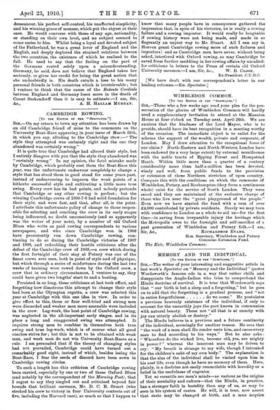CAMBRIDGE ROWING.
[TO THE EDITOR OP THE SPECTA1011.1
SIR,—On my return to town my attention has been drawn by an old Cambridge friend of mine to the comments on the University Boat-RaCe appearing in your issue of March 26th, in which you say, alluding to the Cambridge clew:—" The style they attempted was certainly right and the one they abandoned was certainly wrong."
It is quite true that Cambridge had altered their Style, but I entirely disagree with you that the style they abandoned was " certainly wrong." In my opinion, the fatal mistake made by Cambridge, which probably cost them the Boat-Race this year, was the unfortunate endeavour completely to change a style that has stood them in good stead for some years past, instead of endeavouring to improve the weak points of a hitherto successful style and cultivating a •little more true swing. Every crew has its bad points, and nobody pretends that Cambridge or any other rowing is perfect ; but the winning Cambridge crews of 1906-7-8 had solid foundation for their style-, and were fast, and that, after all, is the point. I attribute this unfortunate policy of change to those respon- sible for selecting and coaching the crew in its early stages being influenced, no doubt unconsciously (and so apparently was the writer of your note), by a number of old Oxford Blues who write as paid rowing correspondents to various newspapers, and who since Cambridge won in 1906 have persistently run down Cambridge rowing, con- tinuing to do so during the Cambridge victories of 1907 and 1908, and redoubling their hostile criticisms after the defeat of the Cambridge crew of 1909,—a crew which during the first fortnight of their stay at Putney was one of the finest crews ever seen, both in point of style and of physique, but which through a series of misfortunes during the last two weeks of training were rowed down by the Oxford crew, a crew that in ordinary circumstances, I venture to say, they could have given two lengths' start to and a heating.
Persisted in so long, these criticisms at last took effect, and forgetting how disastrous this attempt to change their style had been at the Olympian regatta, a crew was selected this year at Cambridge with this one idea in view. In order to give effect to this, three or four well-tried and strong men were discarded and weaker men more amenable were included in the crew. Leg-work, the best point of Cambridge rowing, was neglected in the all-important early stages, and in its place a long and exaggerated swing was attempted. It requires strong men to combine in themselves both true swing and true leg-work, which is of course what all good coaches strive for ; but this is not to be obtained with weak men, and weak men do not win University Boat-Races as a rule. I am persuaded that if the theory of changing styles had not prevailed, Cambridge could have turned out a remarkably good eight, instead of which, besides losing the Boat-Race, I fear the seeds of discord have been sown in Cambridge rowing circles.
To such a length has- this criticism of Cambridge rowing been carried, especially by one or two of these Oxford Blues (and notably by the correspondent of the Morning Post), that I regret to say they singled out and criticised beyond fair bounds that brilliant oarsman, Mr. D. C. R. Stuart (who stroked his crew to victory in four University contests out of five, including the, Harvard race), so much so that I happen to
know that many people have in consequence gathered the impression that, in spite of his victories, he is really a rowing failure and a rowing impostor. It would really be laughable if =rowing history were not being made, and made in so flagrantly an unjust way to Mr. Stuart. All I can say is, Heaven grant Cambridge rowing more of such failures and impostors! and as Cambridge men have never, without being asked, interfered with Oxford rowing, so may Cambridge be saved from further meddling in her rowing affairs by uncalled- for criticisms in letters to the Press of certain old Oxford
University oarsmen.—I am, Sir, &c., W. B. CLOSE,
Ex-President
[We have dealt with our oorrespondent's letter in our leading columns.—En. Spectator.]














































 Previous page
Previous page